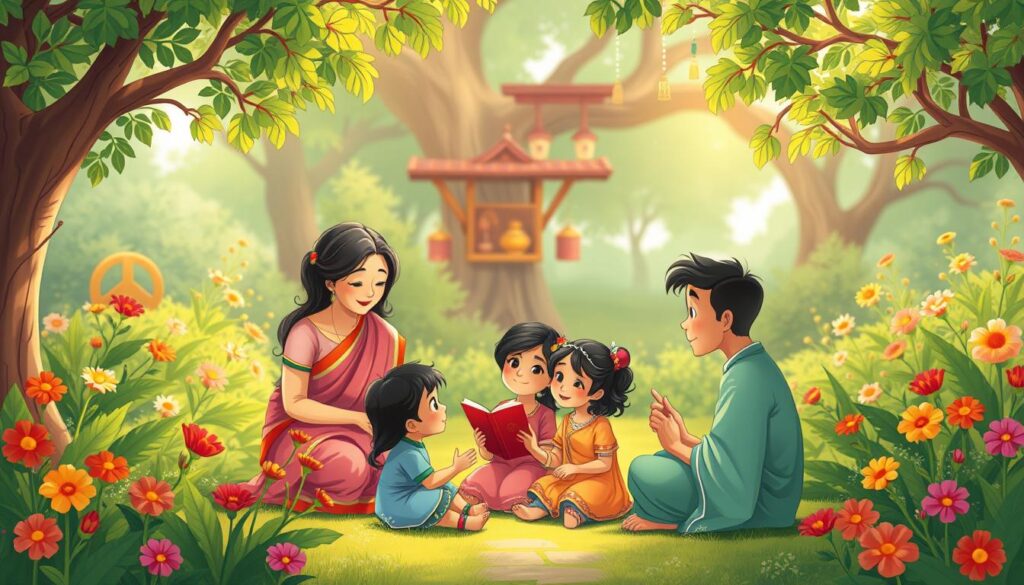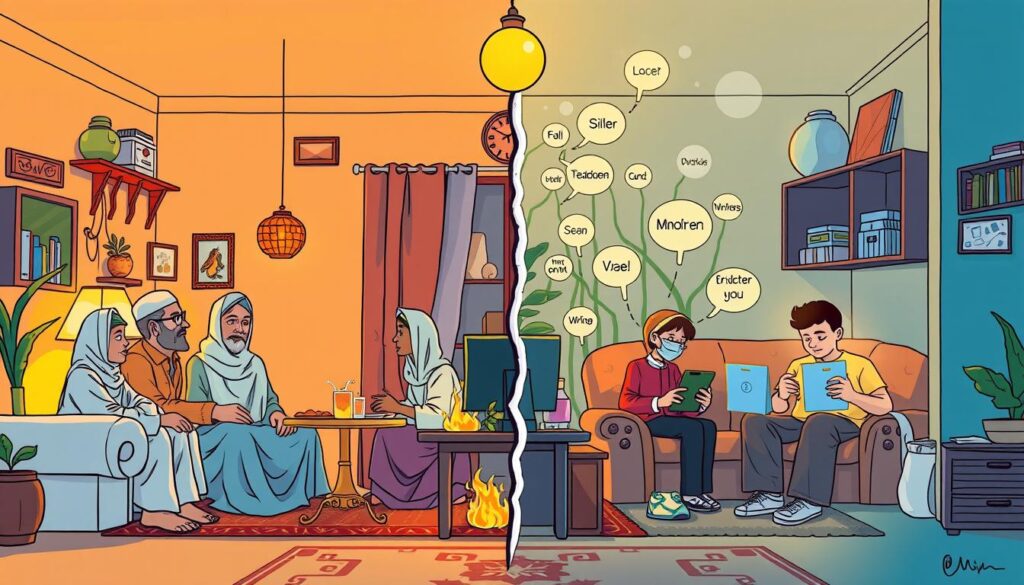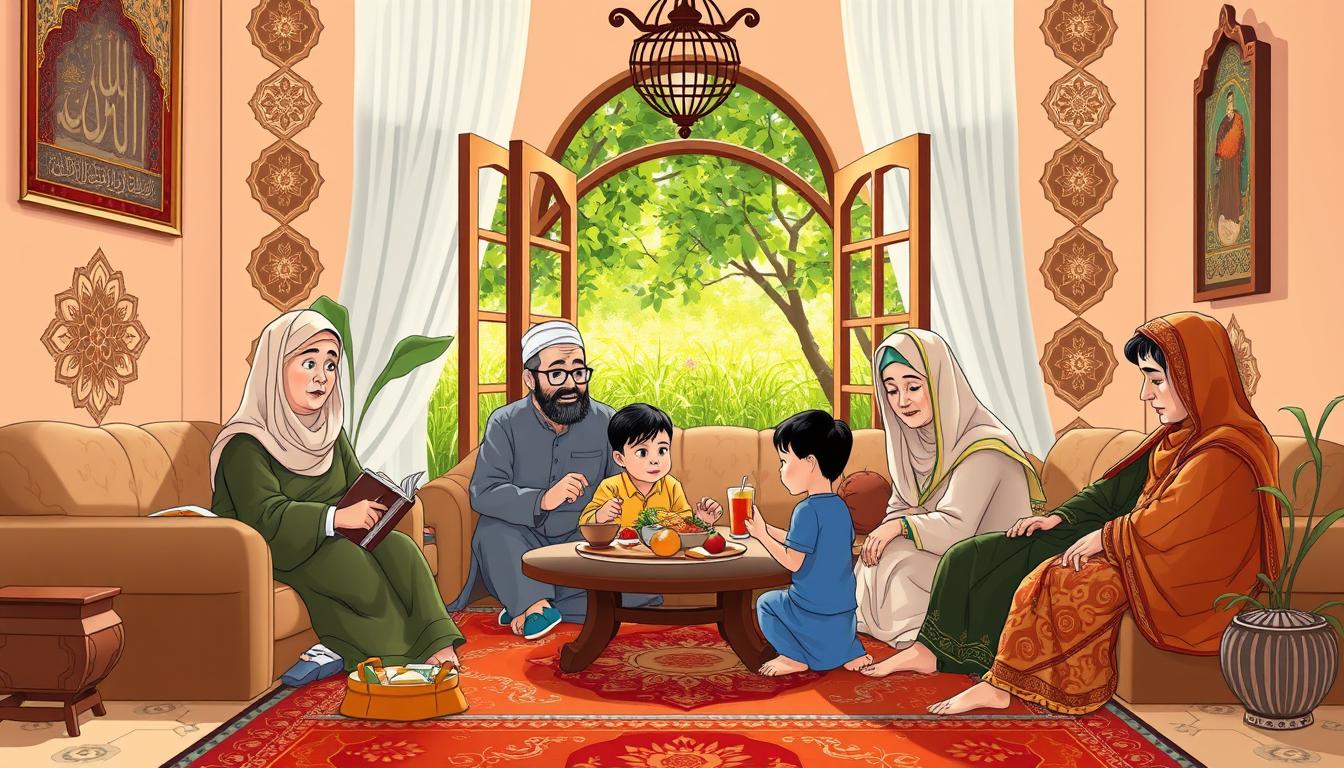In Islam, the family is seen as the backbone of society. It plays a key role in teaching individuals about strong moral values. It guides them on the right path. The family’s role in Islam is vital for a strong society.
The Islamic view on family focuses on love, mercy, rights, and duties. It shows how important family is in teaching values and virtues.
Strong family ties and following Islamic values make the community stronger. This creates a society based on unity, compassion, and support. We want to show how important family is in Islam and its role in building a strong society.
Key Takeaways
- The family is the cornerstone of society in Islam, playing a vital role in nurturing individuals with strong moral values.
- The Role of Family in Islam is essential in building a strong foundation for society.
- The Islamic perspective on family emphasizes love, mercy, rights, and responsibilities.
- Family stability is considered a significant factor in ensuring social stability within the broader community in Islamic teachings.
- By nurturing strong family bonds and upholding Islamic principles, the community is fortified, creating a society that thrives on unity, compassion, and mutual support.
- We aim to highlight the importance of family in Islam and its role in building a strong foundation for society.
Importance of Family in Islamic Teachings
Family is very important in Islam. It affects our happiness and the happiness of others. The Quran teaches us to love and be kind to our families. The Hadith guides us on how to treat each other with respect and fairness.
The Importance of family in Islam is clear from the Quran and Hadith. They tell us to love, be merciful, and respect each other. This way, families can grow strong and help society.
- Charity to family members is the best act of kindness in Islam. It shows how important family support is.
- Maintaining family bonds is very dear to Allah. It shows how vital family ties are.
- Being kind and gentle to family members brings good things. It shows the value of family in Islam.
By following these Family values in Islam, we can make our families stronger and more loving. This helps create a peaceful society. Remember, family is key to our happiness and well-being.
Structure of an Islamic Family
In an Islamic family, the Family structure in Islam is built on respect, cooperation, and responsibility. The husband is seen as the leader, responsible for supporting his family. The wife takes care of the home and looks after the children.
The Roles and Responsibilities of Parents are key in raising their kids right. They should be kind and respectful to their children. This helps in teaching them good manners and care.
- Providing for their children’s physical and emotional needs
- Teaching their children about Islamic values and principles
- Encouraging their children to develop good manners and behavior
By doing these things, parents can build a strong and loving family. This is important for the growth and happiness of their children.
Family as a Source of Support
We see the family as a key source of support. It offers emotional, financial, and psychological help to its members. In Islam, the family is a safe haven, giving a sense of belonging and security.
Emotional support from family is very important, more so during tough times. Family members are urged to look out for each other’s well-being. This support can come in many ways, like:
- Active listening and empathy
- Physical comfort and affection
- Financial help and security
Families create a stable and loving space. This helps members face challenges and reach their goals. We aim to support each other, seeing the family’s role in our lives.
By supporting each other, we build stronger families and communities. This has a positive effect on everyone, bringing harmony and peace.
| Family Support | Benefits |
|---|---|
| Emotional Support | Provides comfort and stability |
| Financial Assistance | Helps with economic stability |
| Psychological Support | Helps with mental well-being |
Family and Moral Education
Family is key in teaching morals, shaping who we are. It’s where we learn important values and ethics. Teaching Values and Ethics helps us become better, more caring people.
Family education teaches us to be honest, kind, and respectful. It’s about growing spiritually and developing our character. Islamic teachings show us how vital family is in this process.

- Instilling moral values and ethics
- Promoting spiritual growth and character development
- Creating a nurturing environment that supports individual growth
By focusing on these, we help people become caring and responsible. This makes our community better and more united.
Gender Roles within the Family
We aim to provide insight into the Islamic perspective on Gender Roles within the Family. We focus on the responsibilities and rights of husbands and wives. In Islam, each has unique roles and duties. Husbands are expected to provide for the family, while wives manage the household.
Islamic teachings say men are the “guardian of [his] family.” Women are seen as the “guardian of her husband’s home and his children.” Yet, this doesn’t limit women’s rights. In fact, Islamic Perspectives on Husbands and Wives stress the need for mutual respect, cooperation, and responsibility.
Some key points to consider include:
- Men are responsible for providing for the family (Quran 4:34)
- Women are responsible for managing the household
- Mutual respect and cooperation are essential for a harmonious family environment
In conclusion, Gender Roles within the Family are key in Islamic teachings. They highlight the importance of mutual respect, cooperation, and responsibility. By understanding and fulfilling their roles, husbands and wives can build a harmonious and stable family environment.
| Role | Responsibilities |
|---|---|
| Husband | Providing for the family, protecting and maintaining the family |
| Wife | Managing the household, taking care of children and family members |
Family and Community Ties
We know how vital family is in creating community bonds. In Islam, families are urged to connect with their neighbors and community. This helps everyone support and help each other.
Building strong Family and Community Ties makes us feel part of something bigger. It helps our community thrive. We can do this by Building Relationships with Neighbors and taking part in community events.
Here are some ways to strengthen community ties:
- Joining in local events and activities
- Helping out with community service
- Hosting events for the community
Together, we can make our community stronger and more united. As we focus on Family and Community Ties, we positively impact those around us. This helps our community grow and flourish.
| Community Activity | Benefits |
|---|---|
| Participating in local events | Meets new people, builds relationships |
| Volunteering for community service | Helps those in need, builds a sense of community |
| Hosting community gatherings | Fosters a sense of belonging, builds strong relationships |
The Impact of Family on Children
We know how important family is in shaping children’s lives. The Impact of Family on Children is key to their growth. Islamic teachings stress the role of family in Instilling Religious Practices and helping with school and social skills.
Islamic teachings say parents must teach their kids about religion. They should guide them in daily prayers, teach the Quran, and encourage giving to others. A loving home helps kids become caring and responsible adults.
Here are some ways families can help their kids grow:
- Creating a supportive and caring space
- Encouraging open talks and respect
- Helping with school and social life
- Teaching important religious values
By following these ideas, we can raise kids who are both capable and kind. As we aim for a brighter future, we must value family’s role. They help shape our children’s lives and Instilling Religious Practices for their journey.
| Aspect of Development | Family’s Role |
|---|---|
| Religious Development | Instilling religious practices and values |
| Academic Development | Guiding and supporting their children’s education |
| Social Development | Encouraging social interaction and community involvement |
Challenges Facing Muslim Families Today
We see the hurdles Muslim families face today, like how modern life changes their old ways. These families deal with many issues, including how modern life affects their values and actions.
Some big challenges for Muslim families include:
- Increased divorce rates and separation
- Domestic violence and child abuse
- Intergenerational conflict and teenage pregnancies
- Young married couples opting for separation and divorce instead of trying to work things out
These problems often come from modernization and its effects on their traditional values and ways of life. As Muslim families adjust to new societal values, they must find a balance. They need to keep their cultural and religious heritage alive.

By understanding the challenges facing Muslim families and the role of modernization and its effects, we can help support these families. We can assist them in navigating today’s complex world while keeping their faith and cultural traditions strong.
| Challenge | Effect on Muslim Families |
|---|---|
| Modernization | Changes in traditional values and practices |
| Increased divorce rates | Breakdown of family unity and stability |
| Domestic violence and child abuse | Physical and emotional harm to family members |
Strengthening Family Bonds
We think it’s key to Strengthen Family Bonds for a happy family. Doing Family Activities and Spiritual Practices helps families come together. This makes our homes more peaceful and loving.
Here are some ways to make family bonds stronger:
- Spending quality time together as a family
- Engaging in Spiritual Practices such as prayer and charity
- Showing kindness and compassion towards one another
By following these tips, we can build a loving and supportive family. This is vital for our emotional and mental health.
The Long-Term Benefits of Strong Families
Strong families are key to a harmonious society. They are the foundation for a stable community. By building strong family bonds and following Islamic principles, families can make a lasting impact on future generations.
Families are the core of communities. When they are based on faith and support, they help bring people together. The Quran teaches us to know and respect each other, showing the value of family ties.
The Quran and Sunnah guide us to care for our families. They teach us to prioritize family well-being. By doing so, families become a source of comfort and guidance, helping to create a more united society.
Let’s focus on strengthening our families. By doing so, we can create a future filled with love, cooperation, and faith. Together, we can build a society that truly reflects Islamic values.






